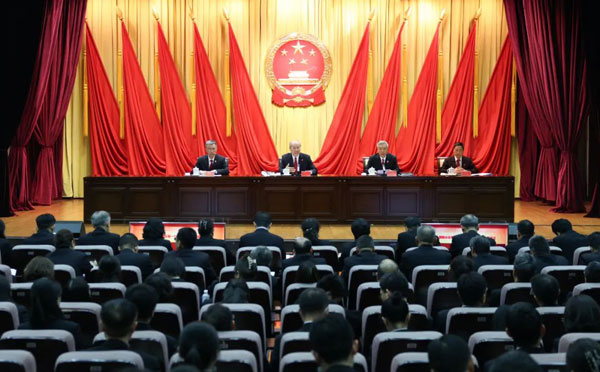SPC underscores quality and efficiency in criminal adjudication work

The Supreme People's Court (SPC) holds a video conference on criminal adjudication work on April 30. Zhang Jun, president of the SPC, attended the meeting and delivered a speech. [Photo/court.gov.cn]
The Supreme People's Court (SPC) held a video conference on criminal adjudication work on April 30, highlighting the need to improve the quality and efficiency of the work and enhance the capabilities of judicial teams in order to promote the high-quality development of criminal adjudication.
Zhang Jun, president of the SPC, attended the meeting and delivered a speech. Participants in the meeting reviewed related work in the past year and specified priorities for promoting the sector's high-quality development.
It was noted at the conference that over the past year, the people's courts have centered their judicial work on the theme of "justice and efficiency," and made new progress and achievements on all fronts.
They have fully leveraged the role of criminal adjudication and served the country's overall development and people's justice, participants said.
It was highlighted at the meeting that serious criminal offenses must be severely punished in accordance with the law, the crackdown on gang crimes should be an ongoing effort, and the rule of law must be firmly upheld.
While calling for adhering to evidence-based, law-based judgment to ensure all cases can withstand the test of law and history, the meeting emphasized the application of criminal policies that combine punishment with leniency in order to secure better political, social and legal effects.
To serve the country's high-quality development with high-level security, efforts should be made to contribute to creating a business environment governed by a sound legal framework, as pointed out at the meeting.
They also urged for greater efforts to advance compliance reforms of companies involved in relevant cases in order for maximum benefits for those enterprises, and handle economic crimes, which harmed the rights and interests of a large number of people, in a lawful and prudent manner.
The importance of combining judicial work with social governance efforts was underscored at the meeting, urging judicial workers to be good at identifying and addressing issues by studying frequently occurring cases, and provide high-quality suggestions for resolving commonly seen problems, enhancing communication and collaborating with relevant authorities to address institutional loopholes and governance deficiencies.
Measures should be taken to prevent the occurrence of mislabeling civil cases as criminal cases, as well as misdemeanors as severe offenses, they said, and comprehensive strategies should be in place to prevent and punish juvenile crimes. In handling juvenile delinquency, focusing solely on punishment is by no means a solution, and addressing the root causes is the fundamental strategy, they added.
It was highlighted at the meeting that court hearing-centered adjudication must be upheld to ensure that court hearings play a decisive role in establishing facts, determining evidence, protecting the rights of the relevant parties and delivering fair judgments. The litigation rights of defendants and lawyers should be fully guaranteed, in order to achieve justice for litigants by ensuring procedural justice, according to the meeting.
It was pointed out at the meeting that first-instance adjudication is the foundation, while second-instance adjudication is crucial in handling criminal cases. The facts and evidence related to cases must be scrutinized to ensure "zero errors." For wrongful judgments that are results of prominent problems in facts and evidence, accountability must be strictly enforced in accordance with the discipline and law, according to the meeting.
Regarding appeals for retrials of criminal cases, heads of courts and tribunals need to prioritize major and complex cases and reinforce guidance in adjudicating those cases, by making good use of the SPC's online case archive, it was noted at the meeting.
More attention also needs to be attached to strengthening the political and professional capabilities of the judicial team to build a lineup of high-quality judicial workers specializing in criminal adjudication, the meeting noted.







